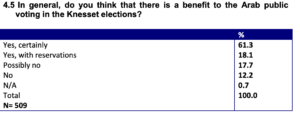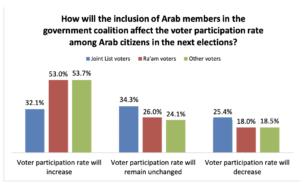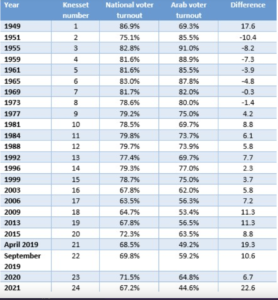By Elal Tilahun
Arab Israelis
The term “Arab Israeli” is used to identify Palestinians who are citizens of Israel, including other ethnic groups such as Circassians, Druze, Bedouins, and other Arab communities. Generally, Arab Israelis are not required to serve in the Israeli army, except for the Druze community.
Introduction
In 2021, history was made in Israel when the United Arab List (Ra’am), an Islamist political party composed of Arab Israelis, joined the Israeli government coalition. It was the first time an Arab party held a direct position in the Knesset, showing changing attitudes regarding the inclusion of Arab Israelis (Boxerman). Of Israel’s 9 million citizens, Arab Israelis make up about 21% or 2 million, making them a distinct and large minority. Despite their numbers, Arab Israelis have historically wielded less political influence than their numbers might suggest. Predominantly descendants of Palestinians who remained after the 1948 Arab-Israeli War, Arab Israelis navigate a dual identity as Palestinians with Israeli citizenship. Their dual identity presents distinct challenges and perspectives that shape their political behavior and sense of belonging. Many feel like second-class citizens, believing they do not have the same rights as Jewish Israelis (Hofman). Given the unique position of Arab Israelis, my research explores the realities of their inclusion within the Israeli democratic political process and the implications of increased Arab Israeli representation in the Israeli government. Specifically, it is important to understand their inclusion because they have the potential to significantly influence Israeli political outcomes.
The Reality of Inclusion
Arab Israeli political parties have existed since Israel’s creation. In 2021, the United Arab List (Ra’am) ran independently and joined the Bennett-Lapid coalition, marking a significant change. This inclusion was seen as a milestone towards greater political participation. However, it hasn’t consistently led to more inclusion or less discrimination for Arab Israelis. Currently, ten Arab Israelis serve in the 120-member Knesset, reflecting some political diversity among parties like Hadash, Ta’al, Ra’am, and Balad. However, internal divisions and ideological differences within these parties have weakened their collective effectiveness, contributing to Ra’am’s departure in 2021 and the dissolution of the alliance in 2022. Voter turnout among Arab Israelis dropped to 44.6% in the 2021 elections, down from 67.4% previously, highlighting issues with mobilizing Arab Israeli voters and achieving sustained political impact.(Tahhan)
The Joint List
The Joint List was a political alliance of four major Arab parties (Hadash, Ta’al, Balad, and Ra’am) that became the third-largest faction in the Knesset in March 2020, it grew from 13 to 15 Knesset members. The alliance achieved significant milestones, including electing the first Arab Israeli woman, Haneen Zoabi, to the Knesset. The coalition amplified the political voice of the Arab community, advocating for equal rights and addressing socio-economic disparities. However, internal divisions hindered their collective effectiveness. For example, Hadash emphasized Jewish-Arab cooperation and social issues, while Balad focused on Palestinian nationalism and rights, leading to conflicting approaches. Disagreements often arose over leadership roles and Knesset seat distribution, as each party sought to maximize its influence. (Iraqi)
Political Public Polling Comparison

Example of 20th Knesset public opinion poll of Arab vote (Rudnitzky, 2015)
2015:
- Sampling Areas: Negev, Nazareth, Galilee, and Triangle—regions with the highest Arab Israeli populations.
- Support for Political Participation: (61.3%) of respondents believed in the benefits of Arab participation in the political process.
- Joint list: (69.1%) support the Joint List after weighting undecided voters; (86.3%) believe the Joint List should continue as a single faction in the Knesset.
- Critical Issues: Internal concerns (44.3%), government policy on Arab population (28.1%), Israeli-Palestinian negotiations (19%)

Example of 2021 Arab Israeli Public Opinion Polling (Rudnitzky,2021)
2021:
- Reuniting the Joint List: (71.4%) supported reuniting the Joint List with Ra’am, and (23.7%) did not
- Ministerial Position for Ra’am: (56.2%) believed Ra’am should demand a ministerial position
- Coalition Participation: Despite the low turnout, only 15.5% believed Ra’am should not have joined the coalition.
- Voter Participation Optimism: (40.5%) believe including Arab members in the coalition will increase voter participation, but there was skepticism about improvements in economic conditions, security, and civil rights under coalition dynamics, and (22.7%) believe it will decrease.
Initially, the Joint List successfully mobilized Arab voters and addressed community concerns. However, internal disputes and ideological conflicts have weakened their unity, affecting voter turnout and public perception. The 2021 survey shows ongoing challenges and divisions within the Arab Israeli community regarding political strategy and coalition dynamics. While there is strong support for keeping a unified Joint List and hopes for better political representation, there are significant concerns about the effectiveness of Arab parties in improving economic conditions, security, and civil rights within the coalition.

Historical voter turnout of Arab Israelis (Haj-Yahya)
Voter Turnout
Low turnout among Arab Israelis reflects a broader sentiment of marginalization and a lack of faith in the political process. Many feel their vote doesn’t significantly impact outcomes. The split between Ra’am and the Joint List has contributed to dissatisfaction, as each party has different agendas and priorities, failing to address the diverse needs of the Arab community. Additionally, increasing anti-Arab legislation impacts their sense of belonging. This fragmentation undermines the potential for unified and effective political representation, reinforcing feelings of exclusion (Darawshe).
The Importance of the Arab-Israeli Vote
Despite setbacks, Arab Israeli votes play a crucial role in the dynamics of Israeli elections. Their votes can sway the balance in tight electoral races, determining which parties or coalitions gain the upper hand. The ability of an Arab Israeli party to run independently and win seats in the Knesset emphasizes the impact that voting can have in shaping the political landscape. It shows the power voting has and the importance of Arab Israeli political participation. Despite the challenges of unity that the Arab Israeli community faces, their participation in the electoral process remains important. Due to the fact that they are a large minority, Arab Israeli voters could prove decisive in shaping the outcomes of Israeli elections, particularly in closely contested environments. (Debono)
Recent News
October 7th has brought tension to Arab Israeli members of the Knesset. They are often branded as “terror supporters” by their Jewish counterparts. Louay Khatib, a leader of Balad, who has historically been anti-Zionist, criticizes Knesset involvement, arguing it does not effectively advance Palestinian rights and primarily serves to better Israel’s international image. He also goes on to use Mansour Abbas, who is the leader of United Arab list (Ra’am), to say, “Abbas has reached a point where he blames only Hamas and not Israel, despite the crimes it is committing in Gaza.” Other Arab-Isreali leaders, like Sami Abu Shehadeh of the Balad party, argue that despite the limitations, parliamentary work has benefited Palestinian society. It seems that while some leaders are willing to work with the Israeli government to make improvements, others believe this compromises their values and does not address the injustices faced by Palestinians (Iraqi).
Conclusion & Takeaway
The political participation of Arab Israelis is crucial for Israel’s democracy, reflecting both progress and ongoing challenges. The inclusion of the United Arab List (Ra’am) in the Israeli government coalition in 2021 was a significant milestone, suggesting a move towards greater political inclusion. The dual identity of Arab Israelis, as Palestinians with Israeli citizenship, creates unique challenges for political engagement and belonging. Historical periods of military rule and social exclusion have deeply affected the Arab-Israeli community, leading to feelings of being second-class citizens. Whether it is thought that Arab Israeli involvement is meant to push an Israeli agenda or not, the fact remains that this is the first time Arab Israelis have a direct voice in the Israeli government. If they can unite and demand change, there is potential for significant progress in addressing their community’s needs and achieving greater political influence. While the Joint List faced internal divisions and ideological differences, it was effective in unifying the Arab vote and increasing representation. More representation in the Knesset could lead to better policies and more attention to issues affecting Arab communities. Ultimately, the political climate and the willingness of other actors to collaborate with Arab representatives will be crucial for fostering an inclusive democratic process in Israel.
Sources
Boxerman, Aaron. “History Made as Arab Israeli Ra’am Party Joins Bennett-Lapid Coalition | The Times of Israel.” The Times of Israel, June 3, 2021. https://www.timesofisrael.com/arab-israeli-raam-party-makes-history-by-joining-bennett-lapid-coalition/
Darawshe, Mohammad. “Why Don’t the Arabs of Israel Vote More?” Fathom, Spring 2013. https://fathomjournal.org/why-dont-the-arabs-of-israel-vote-more/.Iraqi, Amjad. “The Joint List Is Dead. Who Will Lead the Fight for Palestinian Citizens?” +972 Magazine, November 8, 2022. https://www.972mag.com/joint-list-palestinian-citizens-israel-elections/.
Debono, Gwendoline, and Josh Vardey. “Arab Voters Could Prove Decisive in Upcoming Israeli Elections.” France 24, November 1, 2022. https://www.france24.com/en/middle-east/20221101-arab-voters-could-prove-decisive-in-upcoming-israeli-elections.
Haj-Yahya, Dr. Nasreen Haddad. “Statistical Report on Arab Society in Israel :2021.” Statistical Report on Arab Society in Israel: 2021 – The Israel Democracy Institute, March 17, 2022. https://en.idi.org.il/articles/38540.
Hofman, John E., and Benjamin Beit-Hallahmi. “The Palestinian Identity and Israel’s Arabs.” Peace Research, 9(1), 1977, pp. 13–23. JSTOR. https://www.jstor.org/stable/23686047.
Iraqi, Amjad. “Facing War and Incitement, Is There Any Hope Left for Palestinians in the Knesset?” +972 Magazine, June 6, 2024. https://www.972mag.com/palestinian-citizens-knesset-boycott-gaza-war/.
Rudnitzky, Arik. Main Findings of Public Opinion Survey on the Arab Vote to the 20th Knesset, 2015. https://www.kas.de/c/document_library/get_file?uuid=9784b239-709b-82b4-0893-d222e77068fb&groupId=252038.